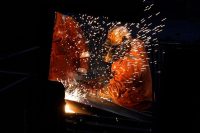It had the history, the manufacturing muscle, the capital, and the brand to make it work. When Ford announced plans to create an all-electric SUV, it looked like the moment the major auto manufacturers could finally bring battery-powered cars into the mass market. Until today. The American company has abandoned its plans to build the new electric car, and announced a $1.9 billion write-off on the project citing cost pressures. The trouble is, if the company that more or less invented the mass production of cars a century ago can’t make electric vehicles (EV) work, then it is very hard to believe that any of the Western manufacturers can.
If Ford is now scaling back, it is hard to see how anyone can compete
This is the latest blow to the struggling EV industry. Despite the billions of euros, dollars and pounds thrown at it in subsidies and tax breaks by governments, and despite targets to replace all the petrol-powered cars on European and American roads over the next decade, sales have stalled, costs have risen, and the manufacturers are struggling.
The likes of Volkswagen and Renault have already scaled back their plans. And now even Ford is throwing in the towel. The company also announced today that it is postponing the launch of its next electric pickup truck. At the same time, it would cut the share of annual capital expenditures dedicated to ‘pure’ electric vehicles from 40 per cent to 30 per cent, and write off much of the money it had already spent.
Meanwhile, the Chinese are still powering into the market. This week, Xaomi, a company best known for its smartphones, said it has comfortably beaten its targets, and now expected to sell 120,000 of its electric cars by the end of 2024 – 20,000 more than initially planned. Its rivals BYD announced last month that its sales were up by 21 per cent over the latest quarter, putting it on track to overtake Tesla; the other major Chinese players are doing just as well.
There is a significance to the Ford decision. Under its founder Henry Ford, this was the company whose the legendary Model T marked the perfection of automobile mass production a century ago, turning the car into a product that everyone could afford. It built manufacturing outposts around the world, including the UK. If Ford is now scaling back, it is hard to see how anyone can compete. The subsidies and industrial strategies have not worked.
True, if we want to hit net zero we may have to switch to battery-powered cars. But we have to accept that it will come at a huge industrial cost, handing one of the largest industries in the world to China, and all the jobs and wealth it creates with it. Ford’s decision this week has confirmed that.







Comments